The surprising explosion of RPG Maker on Steam
How RPG Maker grew from a hobbyist tool into an engine powering hundreds of Steam games a year.
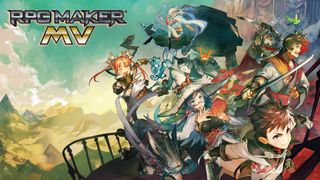
Can a game engine as old as the Super Nintendo remain relevant in 2017? If we're talking about RPG Maker, the answer is a resounding yes. After two decades of relative obscurity, the game-making software has exploded in popularity in recent years, leading to gems like To The Moon, LISA, and Always Sometimes Monsters. Since its first release in the early '90s, RPG Maker has mostly avoided mainstream attention, trundling along as a hobbyist tool for hardcore 16-bit JRPG fans. It wasn't until 2007 that the community even established a central repository for sharing advice and distributing their games. Dubbed the RPG Maker Network, it hosted more than 50 games in 2008, and another 74 in 2009. Many of these games were tech demos and proofs-of-concept, small projects made more for the developer's sake than for the player's. Others were fan games, lifting sprites and lore from established properties. Almost no one was selling their games.
All that changed in 2013. 188 new releases hit the RPG Maker Network. ModDB, the popular modding site, saw 74 stand-alone RPG Maker games added to its database. The next year, Steam got in on the action, adding 30 RPG Maker games in 2014 and following it up with 99 more in 2015 and 135 just last year. RPG Maker has quietly become the go-to tool for aspiring developers who want to make a game and sell it, too.
Why, after more than 20 years, has RPG Maker recently seen such an explosion of popularity? It's the most accessible game engine around, but recent iterations have added the depth needed to make serious games. And, perhaps most importantly, it's on Steam.
Accessibility and customization
From the moment he heard the first stirring notes of the original Final Fantasy, Phil Hamilton fell in love with video game soundtracks. For years he dreamed of scoring an RPG of his own, something in the vein of Chrono Trigger or Secret of Mana. Unfortunately, his style of music never seemed to fit with other people's games, so he decided to take matters into his own hands. Diving into RPG Maker VX, Hamilton began building and scoring his own game, and he was so enamored with the process that he rounded up other like-minded developers and formed Dancing Dragon Games, going on to release standout RPG Maker games like Skyborn and Echoes of Aetheria.
Hamilton attributes much of his studio's success to how user-friendly recent editions of RPG Maker have become.
"From RM2k [RPG Maker 2000] to VX Ace," he says, "there have been a few peaks and valleys but generally speaking I believe VX Ace to be the apex of 'casual' game development. It takes the best of all previous iterations put together."
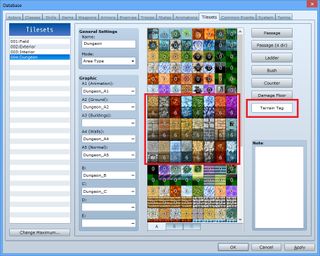
RPG Maker VX Ace, released in the west in 2012, was essentially an enhanced version of RPG Maker VX, incorporating a number of improvements that had kept its predecessor from reaching its full potential. Support for multiple tilesets (the source of a 2D game's sprites) and the addition of numerous DLC resource packs released by Enterbrain, the developer of RPG Maker, made VX Ace the most approachable version of RPG Maker yet. Combined with its release on Steam—the first time RPG Maker had been available on the platform—VX Ace marked the start of a new, more inclusive era for RPG Maker.
Comic deals, prizes and latest news
Sign up to get the best content of the week, and great gaming deals, as picked by the editors.
Increased accessibility isn't the only reason RPG Maker has taken off in recent years. For as welcoming as it is to beginners, the software packs a lot of depth for those willing to sink their teeth into it.
"RPG maker is just great as an entry-level software, but not in a way that's restricting," says Ross Tunney of New Reality Games, makers of the Data Hacker series of RPGs. "There's a much steeper learning curve for Unity, and Game Maker I've found that that is limiting in terms of scope for what you can create."
Key to RPG Maker's depth is how open to customization it is. Though the engine comes packed with basic art and battle systems perfect for first-time developers, it's the support for user-made plugins that studios like Amaterasu Software, makers of the Unforgiving Trials games, find invaluable. From New Game+ modes to character subclass systems, plugins creators like Yanfly have saved Team Amaterasu plenty of development time with their ready-made solutions.
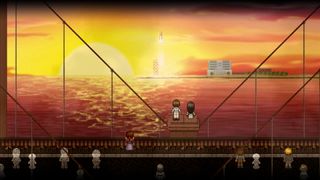
Community
"RPG Maker offers an excellent foundation for game development along with many possibilities for customization," says Martin Matanovic of Team Amaterasu. "Many mundane tasks of game development have been made easier with the tools provided in RPG Maker."
Even with all those advances in approachability, RPG Maker's software is still only half the story. As the engine has evolved, so too has its community, growing from a ragtag group of hardcore JRPG fans into a diverse body of talented developers more than willing to help each other out.
"The RPG Maker community greatly increased both in size and in expertise," recalls Matanovic. "We found many talented artists and developers that helped us along the way."
When I first came on the project, it was me and one other person, and I was just part-time. Now? We have an entire team that handles RPG Maker. It is definitely an entire different ballgame.
Nick Palmer
Much of the community's growth can be traced back to the efforts of Degica, the western publishing partner brought on to help Enterbrain in 2011. In addition to establishing an official RPG Maker forum and staffing it with knowledgeable moderators, Degica regularly updates its blog with tips and tutorials from experienced developers, as well as offering free monthly resource packs containing new art, audio, and scripts for anyone to use.
"We worked to provide more support, more tutorials, and a bigger official community atmosphere for newcomers to join and learn," explains Nick Palmer, community manager at Degica. "When I first came on the project, it was me and one other person, and I was just part-time. Now? We have an entire team that handles RPG Maker. It is definitely an entire different ballgame."
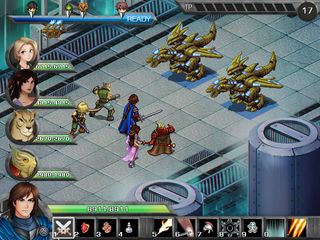
Perhaps most importantly, Degica sees RPG Maker as a product of its users as much as its developers.
"We are always, always listening to the community," says Palmer. "We are with them every step of the way, trying out new games people have made, talking about game design on the forums, or about projects we’ve dreamt up. Being a fan of the product you release is by far the most fun you can have in this field of work."
The rise of indies and RPG Maker stigma
Just as instrumental in RPG Maker's recent popularity is the changing attitude towards indie games. With the success of Braid, Limbo, and Bastion in the late 2000s, the dominance of AAA started to crumble. Sites like indieDB found an audience eager to explore the humbler, more intimate side of gaming. Even Valve sat up and took notice, releasing its Steamworks SDK in 2008 that allowed developers of all sizes to sell their games on Steam without a major publisher, though you still needed a Valve contact to get on the store. Valve followed that up with the launch of Steam Greenlight in 2012, providing developers with an affordable, if not always effective, means of self-distribution.
This shift in public opinion, combined with the rise of crowdfunding platforms like Kickstarter, was a huge win for games with small but passionate audiences—RPG Maker's bread and butter.
"Both the release of RPG Maker on Steam and the opening up of the platform to be easier for indies has let more people than ever discover that the dream of making a game isn’t out of their reach," says Palmer.
"Players are beginning to understand that a great game doesn't need to be a 3D FPS about shooting tanks with your gun," adds Francesco Ficarelli, designer of parody RPG Doom & Destiny. "Now, more players are looking for RPG games like those made with RPG Maker, so if your games looks fun and good, it's likely going to pass Greenlight."
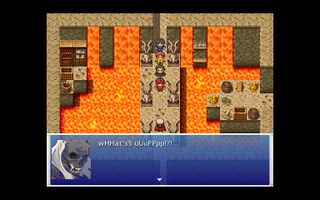
For as little as labels like triple-A and indie mean these days, the RPG Maker branding still carries a nasty stigma. One look at the comments on the Greenlight page for a game like Fantasy Symphony reveals the enmity some people still have for the engine. Frustrating though it can be, Data Hacker developer Ross Tunney understands why.
"I think that community members are very quick to judge now," Tunney says. "Proposing an RPG Maker game with any stock assets on Greenlight is a bold move, even if it has a cool mechanic or premise. It's a shame, but I can understand why so many users are getting tired of seeing the same old artwork and hearing the same music."
For as little as labels like triple-A and indie mean these days, the RPG Maker branding still carries a nasty stigma.
Nevertheless, Tunney believes that the benefits of RPG Maker far outweigh the stigma it carries. "With some custom artwork and soundtrack, anyone can still make a unique-looking game, and if that's coupled with a decent story and characters, then there's still appeal."
The rising popularity of RPG Maker also feeds into the narrative that Steam is being flooded with samey, low-quality games—more than 5,000 games were released on Steam in 2016, according to SteamSpy. But even though new RPG Maker releases seem like a daily occurrence on Steam, they still represent a tiny slice of the total pie. 2.6 percent of Steam's new games, in 2016. That may change with Steam Direct in 2017: it's possible that the fee Valve settles on will lead to fewer RPG Maker games and fewer games in general. But if current trends are any indication, RPG Maker releases will continue to rise on Steam.
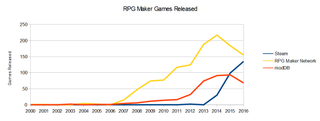
Phil Hamilton, too, sees signs of the stigma fading. "The 'not real games' thing is a thing. I don't know how big it is—I suspect it is a loud minority. Skyborn has seen enough success that it simply doesn't get those comments anymore. People still criticize it, but because of legit things, not because it's made in RPG Maker."
With games like Oneshot and Actual Sunlight redefining what RPG Maker is capable of, the humble engine has a bright future ahead. Behind its simple pixel art lies tremendous depth, and developers are only getting more creative with how they use the engine.
"It really is a circular thing," concludes Nick Palmer. "The more games made, the more people learn it exists, and then the more they make games. More games, more innovation. And hopefully, more people discovering that they can fulfill their dreams of making a game."
Most Popular



